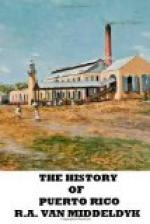Aymamon, feeling himself mortally wounded, sent a messenger to Salazar, begging him to come to his caney or hut to make friends with him before he died. None but a man of Salazar’s intrepid character would have thought of accepting such an invitation; but he did, and, saying to young Juarez, who begged his deliverer not to go: “They shall not think that I’m afraid of them,” he went, shook hands with the dying chief, changed names with him, and returned unharmed amid the applauding shouts of “Salazar! Salazar!” from the multitude, among whom his Toledo blade had made such havoc. It was evident from this that they held courage, such as the captain had displayed, in high esteem. To the other Spaniards they used to say: “We are not afraid of you, for you are not Salazar.”
* * * * *
It was in the beginning of June, 1511. The day fixed by Guaybana for the general rising had arrived. Soto Mayor was still in his grange in the territory under the cacique’s authority, but having received the confirmation of the approaching danger from Gonzalez, he now resolved at once to place himself at the head of his men in the Aguada settlement. The distance was great, and he had to traverse a country thickly peopled by Indians whom he now knew to be in open rebellion; but he was a Spanish hidalgo and did not hesitate a moment. The morning after receiving the report of Gonzalez he left his grange with that individual and four other companions.
Guaybana, hearing of Soto Mayor’s departure, started in pursuit. Gonzalez, who had lagged behind, was first overtaken, disarmed, wounded with his own sword, and left for dead. Near the river Yauco the Indians came upon Soto Mayor and his companions, and though there were no witnesses to chronicle what happened, we may safely assert that they sold their lives dear, till the last of them fell under the clubs of the infuriated savages.
That same night Guarionex with 3,000 Indians stealthily surrounded the settlement and set fire to it, slaughtering all who, in trying to escape, fell into their hands.[18]
In the interior nearly a hundred Spaniards were killed during the night. Gonzalez, though left for dead, had been able to make his way through the forest to the royal grange, situated where now Toa-Caja is. He was in a pitiful plight, and fell in a swoon when he crossed the threshold of the house. Being restored to consciousness, he related to the Spaniards present what was going on near the Culebrinas, and they sent a messenger to Caparra at once.
Immediately on receipt of the news from the grange, Ponce sent Captain Miguel del Toro with 40 men to the assistance of Soto Mayor, but he found the settlement in ashes and only the bodies of those who had perished.
FOOTNOTES:
[Footnote 16: La Espanola.]
[Footnote 17: The chroniclers say fifteen or twenty, which seems an exaggerated number.]




